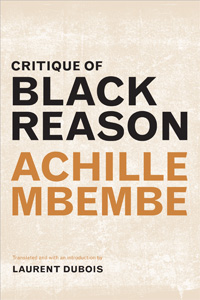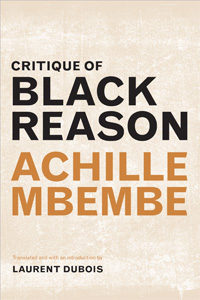

Achille Mbembe’s writings are groundbreaking, truly interdisciplinary in nature, bridging institutional divides between the humanities and social sciences, and affording him recognition as one of the most challenging and stimulating thinkers at work today. Initially published in France in 2013, Critique of Black Reason immediately became incontrovertible reading on the complex dynamic between race and belonging in twenty-first century societies. Though global in reach, the work is primarily infused with insightful analysis and perspectives on the United States, South Africa, and France, spaces in which the historical legacies of slavery, apartheid, and colonialism remain of pertinence to this day, while also being locations in and from which, the author himself has gained particular familiarity as integral components of his intellectual journey and trajectory. For example, in South Africa, discussions over the past quarter of a century have been shaped by reconciliation, restoration, restitution, and reparation, whereas conversations in the United States have focused on the emerging contours of a post-racial society. Meanwhile in France, the very question of race compels one to reckon with a constitution, first drafted in 1791, according to which The French Republic is one and indivisible, a principle that underscores the commitment to protecting the rights of all citizens regardless of ethnicity, religion, or other social associations, a society in which “the racial signifier was always an essential and even constitutive structure of what would become the imperial project” (62). As Laurent Dubois underscores in the introduction, “Our contemporary confrontation with the legacies of this history must nourish itself from, and find illumination in, the work of many who have come before – those who resisted enslavement, those who crafted dreams of alternative worlds, the poets and activists whose presence is as old as the configuration of plantation slavery, the slave trade, and colonialism itself” (xii).
Laurent Dubois reminds readers that Achille Mbembe’s language not only “serves as a conceptual and historical cartography” (xiv), but also that “the existing cartography of terms […] can mean different things in two languages, resonating with vastly different histories of interpretation and sensibility” (xiv). Critique of Black Reason successfully captures the creativity, inventiveness, and extraordinary intricacy of the original French, and I have no doubt readers will agree that the goal of creating “a new map in a new language” (xiv) has been reached. One of the first challenges confronting the translator presented itself with the title and in the face of the term “Nègre.” Ultimately though, as Laurent Dubois indicates, “this is precisely the point. Mbembe offers here nothing less than a map of the world as it has been constituted through colonialism and racial thinking, an archive of entrapment that also serves, perhaps as a guide for escape – or at least the beginnings of a reparation through recognition, the first hint of the constitution of a beyond” (xv).
Any concerted effort at contextualizing blackness historically entails a process of excavation, of paying careful attention to the multiple ways in which a discourse has been built and deployed, a necessary step in the process of unpacking and dismantling the scaffolding that has supported a range of constructs over the years. Ultimately, of course, this entails an engagement with “the logic of self-fictionalization and self-contemplation, indeed of closure” (1), given that “Blackness and race have played multiple roles in the imaginaries of European societies” (1), and because they “have constituted the (unacknowledged and often denied) foundation, what we might call the nuclear power plant, from which the modern project of knowledge – and of governance – has been deployed” (2). This means that we face today the imperative of determining the degree to which we are able to “craft a relationship with the Black Man that is something other than that between a master and his valet” (7), in other words of healing the “wounds and scars” left behind by the “fierce colonial desire to divide and classify, to create hierarchies and produce difference” (7). This is the thought-provoking adventure Achille Mbembe takes us on over the six chapters that follow.
What then, Achille Mbembe asks, might “Black Reason” correspond to? Thinking on this and related questions leads to the recognition that “In its avid need for myths through which to justify its power, the Western world considered itself the center of the earth and the birthplace of reason, universal life, and the truth of humanity” (11). How then can “Black Reason,” a “complicated network of doubling, uncertainty, and equivocation, built with race as its chassis” (10), bring us closer to responding to this undertaking? An initial step entails reaffirming the central role played by fantasy and the imagination (explored at length in Chapter 2: The Well of Fantasies) in categorizing and classifying populations, in examining how the “notion of race made it possible to represent non-European human groups as trapped in a lesser form of being” (17), as recent research on the subject of “human zoos” has highlighted, in “resuscitating a term [Black] that belongs to another era” in order to “question the fiction of unity that it carries within it” (25), and subsequently in “recalibrating” these constructs.
To this end, “Black Reason” could potentially be defined according to a number of criteria: “a collection of voices, pronouncements, discourses, forms of knowledge, commentary, and nonsense, whose object is things or people ‘of African origin’” (27) or the African continent itself, the “living figure of difference” (49) which, “Despite the flood of information to which we now have access and the number of academic studies at our disposal, it remains unclear whether the will to ignorance has disappeared, not to mention the age-old disposition that consists in making pronouncements on subjects about which one knows little or nothing” (70); “the reservoir that provided the justifications for the arithmetic of racial domination” (27); but simultaneously “the daily work that consisted in inventing, telling, repeating, and creating variations on the formulas, texts, and rituals whose goal was to produce the Black Man as a racial subject and site of savage exteriority” (28), “distinct,” ontologically different, separate, apart, in other words defined by a “link of separation,” “the injunction of separation” (46). In due course, Achille Mbembe suggests, “To debate Black Reason is therefore to return to the collection of debates regarding the rules of how to define the Black Man: how he is recognized, how one identifies the animal spirit that possesses him, under which conditions the ratio penetrates and governs the animalitas” (31), and “Race, from this perspective, functions as a security device based on what we call the principle of biological rootedness of he species. The latter is at once an ideology and a technology of governance” (35).
Central to Achille Mbembe’s book, most notably in Chapter 4: “The Little Secret” and Chapter 5: “Requiem for the Slave,” is the question as to how to “think through the modes of inscription of the colony within the Black text” (103), mechanisms and processes of commemoration and memorialization, and how “Through literature, music, religions, and cultural artifacts, Blacks have therefore developed a phenomenology of the colony” (104). Close readings of works by the novelists and playwrights Kossi Efoui (Togo) and Sony Labou Tansi (Congo) reveal how the body itself can be transformed “into the ultimate site of memory” (124). For, as he argues, “The question of the pact with the dead, of the appropriation of a dead person or else of the spirit of another world, is, to a large extent, the question at the heart of the history of slavery, race, and capitalism.
In the final chapter, “The Clinic of the Subject,” Achille Mbembe establishes an intertextual connection with Jean Genet’s 1958 play The Blacks, in which a character famously asks: “But what exactly is a black. Fist of all, what’s his color?” As Achille Mbembe writes, “A word is meant to evoke something in the conscience of the person to whom it is addresses or in the person who hears it. […] ‘Black’ is the name that was given to me by someone else. I did not choose it. I inherited the name because of the position I occupy in the space of the world. Those clothed in the name ‘Black’ are well aware of its external provenance” (151). The discussion turns to the work Aimé Césaire and Frantz Fanon, comparing and contrasting their respective positions on and critiques of colonialism and race consciousness. For, as the former asks, “Who are we in this white world?” (159), leading Achille Mbembe to emphasize how, “in affirming his ‘negritude’ in such a decisive way, he also affirmed a difference that was not to be simplified, not to be veiled, and from which one should not turn away by claiming it was inexpressible” (159).
I am reminded of many of the images that circulated in France on the occasion of the 1931 International Colonial Exhibition, or of posters in 1941 Vichy France – such as Éric Castel’s Trois couleurs, un drapeau, that features the world’s “races” – much in the same way as Achille Mbembe describes the era in which “each race controlled its destiny in the context of a territory over which it fully exercises the rights of sovereignty. Europe belonged to the Whites, Asia to those described as ‘Yellow,’ and Africa to the Africans” (154). In order to dismantle existing constructs and theoretical paradigms, “critical thought had to be deployed like an artillery shell aimed at smashing, puncturing, and transforming the mineral and rocky wall and interosseous membrane of colonialism” (162). As Achille Mbembe concludes, “if we embrace and retain the signifier ‘Black’ not with the goal of finding solace within it but rather as a way of clouding the term in order to gain distance from it,” the potentiality emerges of “reaffirm[ing] the innate dignity of every human being and of the very idea of a human community, a same community, an essential human resemblance and proximity” (173). The arguments made by the intellectual giants that were Aimé Césaire and Frantz Fanon remain relevant to our contemporary times. And must endeavor to “reactualize this marriage of struggle of criticism” (169), for “Whatever the location, epoch, or context in which they take place, the horizon of such struggles remains the same: how to belong fully in this world that is common to all of us, how to pass from the status of the excluded to status of the right-holder, how to participate in the construction and the distribution of the world” (176).
In the “Epilogue,” Achille Mbembe introduces a range of terms and practices to French-language audiences that are today associated with the post-apartheid context in South Africa, yet terms that also seem highly appropriate to the North American and European framework, namely restitution and reparation: “To build a world that we share, we must restore the humanity stolen from those who have historically been subjected to processes of abstraction and objectification. From this perspective, the concept of reparation is not only an economic project but also a project of reassembling amputated parts, repairing broken links, relaunching forms of reciprocity without which there can be no progress for humanity” (182). Clearly, when one attempts to comprehend the logic informing the 2005 Debré Law in France “concerning the recognition of the Nation and national contribution in favor of repatriated French” or for that matter the controversy triggered by then presidential candidate Emmanuel Macron when he asserted on February 14, 2017, during a visit to Algeria, that “Colonization is part of French history. It is a crime. It is a crime against humanity, a truly barbarous crime that is part of our history, and we need to confront this past by apologizing to the women and men against whom we committed these acts,” an arduous task faces those seeking to improve the aforementioned dialogue. Furthermore, there has been a disquieting resurgence of exclusionary, nativist, xenophobic, Islamophobic, and racist discourses in recent years, as exemplified by debates around the “Brexit” vote in the United Kingdom, during the 2016 U.S. presidential elections, in a range of far-right policies and political agendas in Europe (the Front National in France and the Party for Freedom in the Netherlands), and of course elsewhere in the world as with India’s Narendra Modi and his overtly anti-Muslim “new society.”
“In our world of hierarchical division,” Achille Mbembe argues, “the idea of a common human condition is the object of many pious declarations. But is far from being put into practice. Old colonial divisions have been replaced with various forms of apartheid, marginalization, and structural destitution” (161). Former French Prime Minister Manuel Valls, in the aftermath of the 2015 terrorist attacks in Paris, invoked new forms of postcolonial racism, having recourse to the word “apartheid,” not a “legal” apartheid (as was the case in South Africa) nor to “official segregation” (as had been the case in colonial empires or in the United States), but rather to a “situational apartheid” that had been handed down as a heritage since the process of colonial independence got underway in the 1950s. Thus, “encouraged by the processes of globalization and the contradictory effects they provoke, the problematic of race has once again burst into contemporary consciousness” (21), and “Race and racism, then, do not only have a past” They also have a future, particularly in a context where the possibility of transforming life and creating mutant species no longer belongs to the realm of fiction” (21). Achille Mbembe’s brilliant and pioneering Critique of Black Reason calls upon his reader for engagement and vigilance, accentuating how, “In liberal democracy, formal equality can therefore only be paired with the natural prejudice that leads the oppressor to disdain those who were once his inferior even long after they have been emancipated. Without the destruction of prejudice, equality can only be imaginary” (83).
Reviewed by Dominic Thomas, UCLA
Critique of Black Reason
by Achille Mbembe
Publisher: Duke University Press
Hardcover / 240 pages / 2017
ISBN 9781628923025
To read more book reviews, please click here.
Published on July 6, 2017




